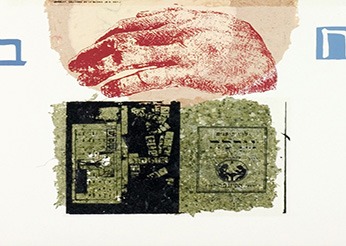Sociolinguistic Discrimination of Maghreb Jews
DOI:
https://doi.org/10.17851/1982-3053.13.25.199-212Keywords:
Hebrew, Sociolinguistics, DiscriminationAbstract
The aim of this paper is to prove that a considerable amount of the Arabic terminology that appears in spoken Hebrew comes, almost in its entirety, from Arabic spoken by Jews in North Africa. Additionally, I will endeavor to explain why these linguistic structures are considered below standard and almost all of them are perceived as having negative connotation, relating this reality to the socio-cultural position of Jews speaking Jewish Arabic, that is, a position marginalized within Israeli society ever since the massive arrival of immigrants from the Arab countries. By analyzing the linguistic penetration of these terms as well as their negative connotation, we may infer that this phenomenon is directly linked to a form of socio-cultural discrimination against such speakers.
Downloads
References
DZIENCIARSKY, Damián A. A extraposição no Hebraico. Um fenômeno linguístico do idioma ou discriminação dos judeus da comunidade oriental. São Paulo: Universidade de São Paulo, 2012. Disponível em: http://www.teses.usp.br/teses/disponiveis/8/8158/tde-08012013-144053/pt-br.php. Acesso em: 11 out. 2019.
EIZENSHTADT, Shmuel. Haxevrá Haisraelit Bitmuroteia (A sociedade israelense e as mudanças). Jerusalem: Agnus Press, 1988.
ELLA, Shohat. Os sefarditas em Israel. O sionismo do ponto de vista das vítimas judaicas. Novos Estudos 79, II, nov. 2007.
EZRAHI, Yaron. Rubber Bullets: Power and Conscience in Modern Israel. New York: Farrar: Straus and Giroux, 1996.
KIMERLING, Baruch. Mehagrim, Mitiashvim, Ielidim (Migrantes, Colonos, Nativos). Tel Aviv: Am Oved, 2004.
LEHMANN, David; SIEBZEHNER, Batia. Remaking Israeli Judaism: The Challenge of SHAS. Oxford: Oxford University Press, 2006.
PICARD, Avi, Reshitá shel haaliá ha selectivit bishnot haxamishim (Começo da imigração seletiva dos anos 50). Iunim bitkumat Israel 9, 1999, p. 338- 394.
ROZENCHAN, Nancy. Representação do marroquino na literatura hebraica contemporânea. Arquivo Maaravi (UFMG), v. 1, n. 6, Minas Gerais: Universidade Federal de Minas Gerais, p. 20-30, 2010.
ROZENTAL, Rubik. Hashpaat Iotzei Tzfon África al Halexicon Haisraelí (Influência dos migrantes do Norte da África sobre o léxico israelense). Hed HaUlpán Hechadash, n. 96, Jerusalem: Ministério de Educação israelense Press, p. 67- 72, 2010.
SAID, Edward. Orientalismo: o Oriente como invenção do Ocidente. São Paulo: Companhia das Letras, 2003.
SÁNCHEZ, Pablo. Marruecos tras la conquista islámica: un estudio de geografía dialectal. Estudios de dialectología norteafricana y andalusí, n. 11, Zaragoza: IEIOP Press, p. 101-119, 2007.
SEGEV, Tom. The First Israelis. Universidade de Michigan, 2008.
SHENHAV, Yehouda. Modernity and the hybridization of nationalism and religion: Zionism and the Jews of the Middle East as a heuristic case. Theory and Society, 1-36, 2007.
SMOOHA, Samy. Shesaim Maamadiim, Edatiim Veleumim Ve Democratia Beisarel (Brechas de classe, étnicas e nacionais e democracia em Israel). In: RAM, Uri (Org.). Hachevrá Haisraelit: Ebetim Bikortiim, p. 172- 202 (A Sociedade Israelense: Tópicos críticos). Tel Aviv: Breirot Press, 1993.
SOMEK, Roni. Machteret Hexalav (A resistência do Leite). Hor Yehudá, Zmurá Bitán Press, 2005.
TOPEL, Marta. Uma Tradição milenar, uma ciência moderna. A Antropologia Israelense: Autores e leitores. Campinas: Unicamp, 1996.
WEINGROD, Alex. The Two Israels. Commentary. New York: The American Jewish Committee Press, n. 33, p. 313- 319, 1962.
YIFTACHEL, Oren. Social Control, Urban Planning and Ethno-Class Relations: Mizrahi Jews. Israel’s ‘Development Towns’. The Wiley-Blackwell Press, p. 1- 21, 2000.
Downloads
Published
Issue
Section
License
O autor cede os direitos autorais à revista Arquivo Maaravi. Os direitos de licenciamento utilizados pelo periódico estão sob a Licença Creative Commons do tipo atribuição BY: são permitidos o compartilhamento (cópia e distribuição do material em qualquer meio ou formato) e adaptação (remix, transformação e criação de material a partir do conteúdo assim licenciado para quaisquer fins, inclusive comerciais.











